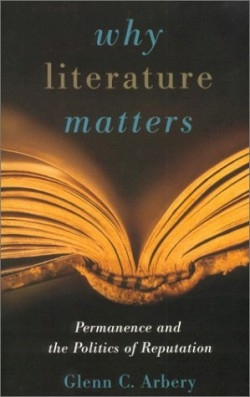Why Literature Matters
Permanence and the Politics of Reputation
The author notes a curious confluence early on in this generally praiseworthy set of essays, before he abandons altogether the inferences of his provocative subtitle. Arbery cites some damning local press that Nobel Laureate Seamus Heaney received for his rhetorical, rural, and stolidly apolitical Irish verse, and asks what we are to make of Heaney’s dedicating a volume of verse to a Harvard teaching colleague, while she subsequently publishes a reputation-burnishing book on Heaney. This red flag suggests fraternizing with the enemy, but Heaney’s “pleasure seeking” metric innovations are praised as a pathway to bring the invisible spirit into the visible, verbal world of the poem. His literature matters, in effect, because it gives the reader (in Kenneth Burke’s phrase) “equipment for living” in their own skin, in or out of a war zone. The violence of the world does not win.
With Heaney, as in the other essays, on topics as varied as Othello, Toni Morrison, Tom Wolfe, and Emily Dickinson, the troubling but fascinating paradox of great literature remains. How does the world become word? How do feelings resolve themselves into imminent artistic structure? How do these structures survive?
Answering this last question, Arbery presents a close reading of The Iliad, specifically the death of Achilles, in the collection’s most persuasive essay, which justifies the battle-cry title of a besieged academic. It blends recent scholarship and a poet’s ear for nuance (Arbery is both a poet and a professor of literature at the Dallas Institute of Humanities and Culture) to illustrate how Homer’s epic poetic structure stands the test of time, how a great deal of feeling is put into few words. Yet while a fortunate few still read The Iliad, its heroic form is dead to writers. (Literary forms die, as did English verse drama, or Miltonic epics.) Poets have become the unlikely hero (or anti-hero) of their own works, in effect their own Homer, narrating their own travails, but still beseeching the Muse for formal structure.
As in Hannah Arendt’s definition of a classical hero, they need not be valiant, or peerless; they are courageous merely by forsaking the private to act and speak in public, to begin their own story aloud. It may be a greater thing to be a coward. Thus, in a larger arc, Homer’s Achilles and Heaney share a classical continuum, doing that rare thing: acknowledging aloud their private selves, teaching us how to listen to our own. For this reason, literature matters.
Reviewed by
Leeta Taylor
Disclosure: This article is not an endorsement, but a review. The publisher of this book provided free copies of the book to have their book reviewed by a professional reviewer. No fee was paid by the publisher for this review. Foreword Reviews only recommends books that we love. Foreword Magazine, Inc. is disclosing this in accordance with the Federal Trade Commission’s 16 CFR, Part 255.

